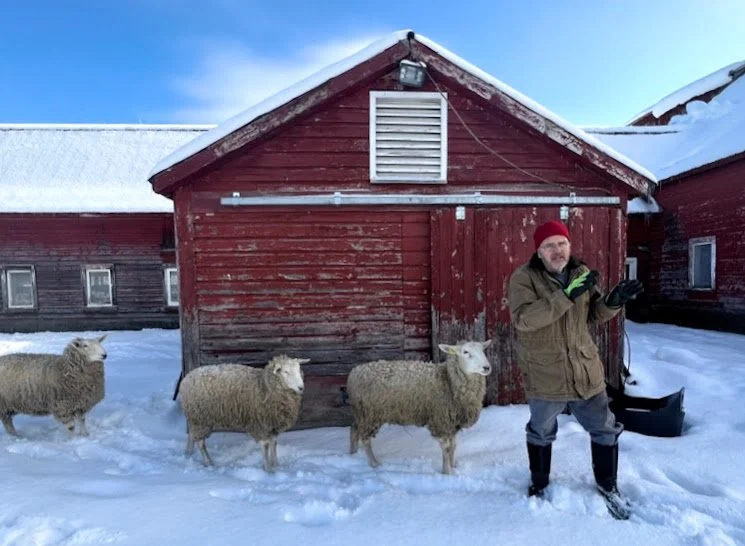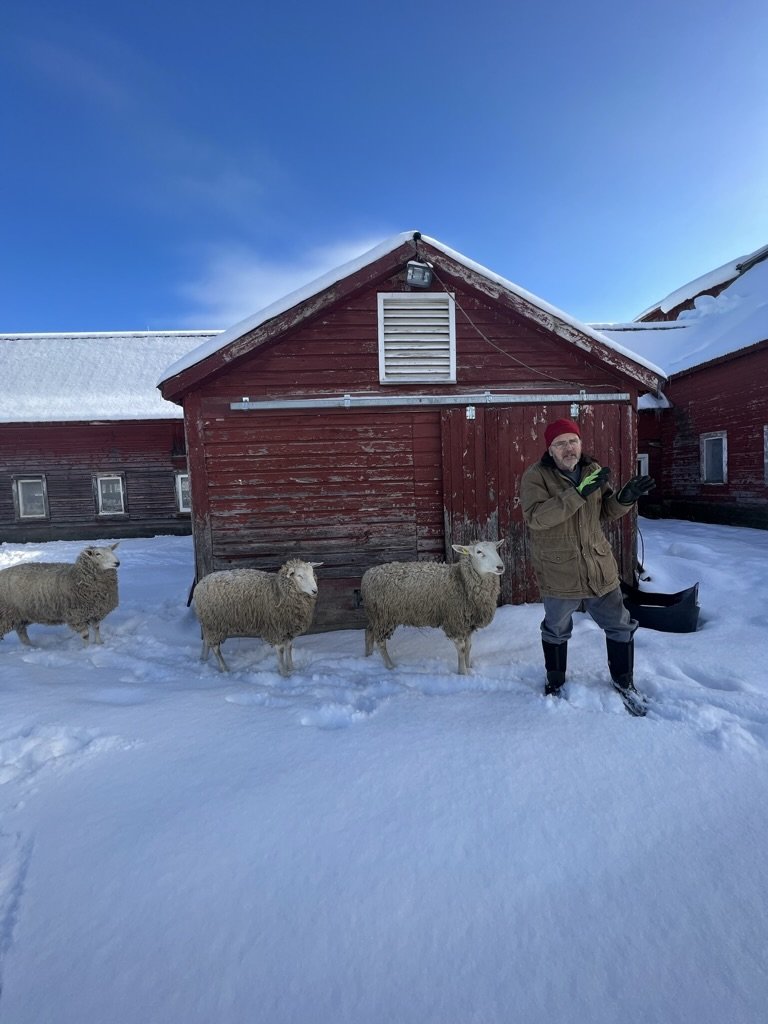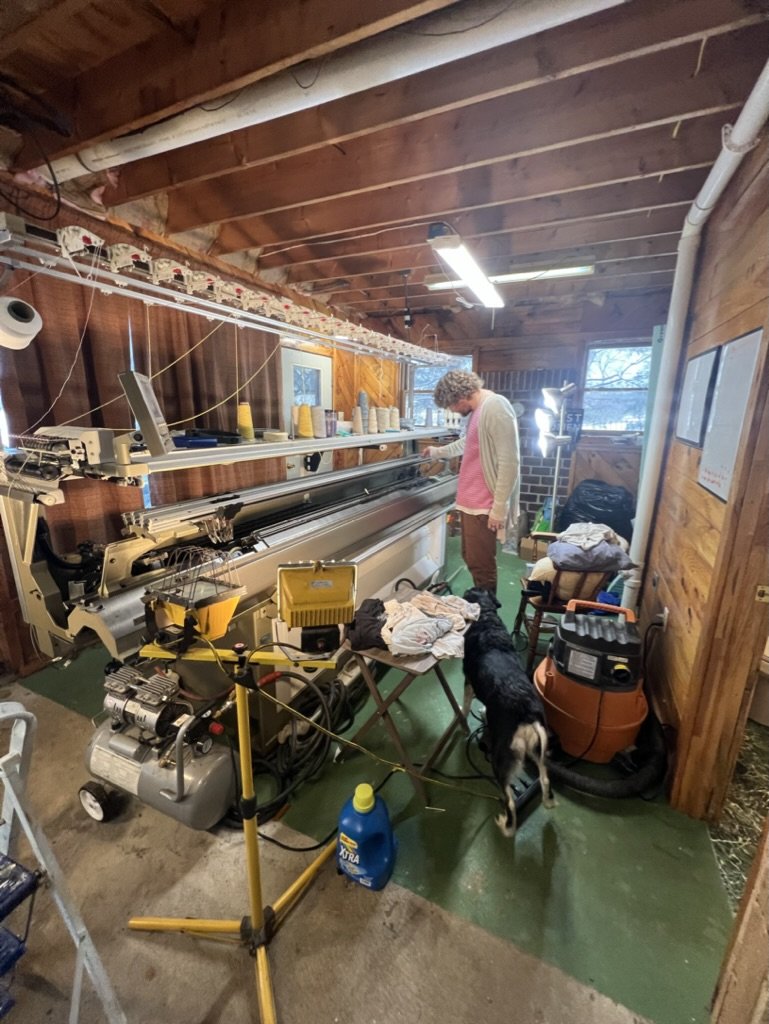From sheep to shop, here’s how one Vermont sweater biz fights fast fashion
Shepherd Dave Martin, left, lends his sheep’s wool to Muriel’s of Vermont. Cyrus Brooks, right, owns the company with his mother, Laura Jacoby, and runs their whole-garment knitting machine to turn yarn into sweaters. Photos by Kayla Duvel
Not all of Dave Martin’s sheep have names. He likes some more than others.
He should probably name them all, though, because they deserve some credit: Martin’s flock at his Underhill farm is the starting point for every sweater from Muriel’s of Vermont.
Muriel’s is a mother-and-son garment business based out of a makeshift workshop in Grand Isle, down the road from the island’s state park. The duo sources fleece for its sweaters and sweater-vests from local shepherds, driven by the same small-scale sensibility for which many Vermont craftspeople strive.
“Muriel’s was mom’s brainchild,” said Cyrus Brooks, 24, who co-owns the company with his mother Laura Jacoby, 57.
The two started the business in 2018 after Jacoby took interest in hand-crank knitting using local wool she picked up from farmers markets. As a child she had watched her late mother, Muriel, craft clothes just like that, and Jacoby wanted to do the same.
From this interest Jacoby spun a framework that could turn her hobby into a business — and provide an avenue to work on sustainable, locally sourced fashion on a large scale. Naturally, she named the company after her inspiration.
Brooks is responsible for the designs of their garments and for keeping their Shima Seiki whole-garment knitting machine in working order.
“Whole-garment knitting technology is like a 3D printer for sweaters,” said Brooks, who cleans the high-tech machine’s 1,600 needles annually to remove any debris. “It takes a ton of tedious work, but I’m pretty proud of this.”
The machine Brooks mans is far from his mother’s hand-crank knitting. It spits out an entire garment, no further assembly required. The machines are typically fed cotton and other fabrics to knit products, Brooks said, and as far as he knows, he is one of the only people in the U.S. using wool instead.
Many fast-fashion companies make sweaters by section, he said, which requires workers to individually stitch arms to the body of a sweater. A small shop like Muriel’s needed something more efficient.
Brooks can run the machine all by himself and produce one sweater an hour. He just needs to keep an eye on it.
“The idea is that if I can make these sweaters faster and more consistently, then we can make something a bit cheaper than something that was handknit and more ethical than something from Forever 21,” said Brooks.
When a sweater comes out of the machine, Jacoby soaks it in a solution of botanical conditioner and vinegar to soften the fabric. Then she dries them and, with a needle and thread, stitches a Muriel’s of Vermont tag above a hemline or on another out-of-the-way spot.
But the mother and son’s process starts long before all of that. Remember Martin and his sometimes-named sheep? Brooks and Jacoby work with other Vermont small business owners like him to see each sweater to completion.
The 76-year-old from Underhill has been raising sheep for 30 years and working with Muriel’s for the past five. He’s one of a few shepherds whose sheep lend their wool to the business’ wares.
Martin and his wife, Donna, own about 80 sheep along with a couple goats and a guard donkey named Holly, whose long ears, near-360-degree vision and squeaking bray make her a sharp sentinel for the others.
“It’s not just a job — it’s a lifestyle and an identity,” Martin said of his family’s farmwork on a recent afternoon outdoors.
Growing up on a dairy farm in the 1950s and ‘60s, Martin developed a sense of care he continues to bring to agriculture.
While other farmers might butcher disabled sheep for meat, Martin insists on raising a blind sheep named 74, who got her name from the tag on her ear.
During the day, while most of the sheep graze, 74 stays inside the barn with a rotating crew of ruminant friends to keep her company in a safe environment.
“If I were a real farmer, she’d be gone, but look at her — she’s 74,” Martin said, summing up a bond the only way he can.
Once a year in late winter, before lambing season, Martin hires professional shearer Gwen Hinman to groom his flock.
When that’s done, they pack four or five massive crates with about 200 pounds of fleece each.
Then they send the crates off to a wool-processing facility, where the fleece is spun into yarn that people like Brooks and Jacoby can knit.
One of those facilities is called Green Mountain Spinnery. The yarn-making factory is in Putney, about two hours south of the Muriel’s workshop in Grand Isle.
Co-founder David Ritchie has been helping run the company for more than 40 years.
The 78-year-old values Jacoby and Brooks’ commitment to being conscious of their agricultural and ecological footprint in the fashion industry.
“They understand this whole concept of small-scale agriculture and improving the land,” Ritchie said. “They want to do something that is good for all of us. They love the fact that they can support these farms and these shepherds and shepherdesses and their sheep.”
He added later, “I feel like their souls are in the right place. I don’t know how else to say it.”
One of Muriel’s goals as a business is to connect Vermont consumers to local farmers and the land.
“I want local wool to be accessible and viable so people have the opportunity to buy ethical clothing,” Brooks said.
From where Martin’s sitting, it’s simple: “When you support local agriculture, you're supporting the community.”
In the future, the business wants to look toward educational efforts too. Plenty of people in Vermont raise sheep either exclusively for wool or for meat, Brooks said, and he wonders if they could waste fewer resources by raising breeds that can offer both.
The company has grown since its founding in 2018, but the essence remains the same.
“There’s no better feeling,” said Brooks, “to know that a sweater didn’t travel outside the state of Vermont.”
Editor’s note: David Ritchie’s role with Green Mountain Spinnery has been clarified.





